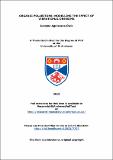Organic polaritons : modelling the effect of vibrational dressing
Abstract
This thesis is a theoretical study of the effects of vibrational degrees of freedom on the polariton physics. The work is motivated by recent experiments, which show that by allowing light to strongly couple with organic matter (inside a microcavity), polariton condensation can occur at room temperature. We begin by introducing a model, which describes localised electronic excitations of molecules coupled to cavity photon modes. The additional feature is the coupling between electronic excitations and local vibrational modes of molecules.
Investigations of equilibrium phase diagrams and absorption spectra of the system (with a single cavity mode and without disorder) have revealed that coupling to vibrational modes acts to suppress the effective light-matter strength, can give rise to a sequence of normal-condensed-normal transitions as a function of temperature, and can drive the phase transition first order. We have also found that despite the vibrational sidebands existing at energies below the lower polariton, they cannot result in condensation, though their admixture has been found in the state which acquires macroscopic occupation.
Secondly, we focused on the effects of excitonic disorder and the possibility of the ground state reconfiguration in ultra-strong coupling regime, with the aim to explain the temperature dependence of absorption spectra published in [A. Canaguier-Durand et al. Angew. Chem. Int. Ed. 52, 10533 (2013)]. We have found that the latter mechanism, although not impossible, could not result in any observable changes as, for the experimental parameters, it is too weak. The study of absorption spectra in the presence of disorder has revealed that the temperature dependence can be accounted for by the vibrational dressing of electronic transitions.
Type
Thesis, PhD Doctor of Philosophy
Collections
Items in the St Andrews Research Repository are protected by copyright, with all rights reserved, unless otherwise indicated.

